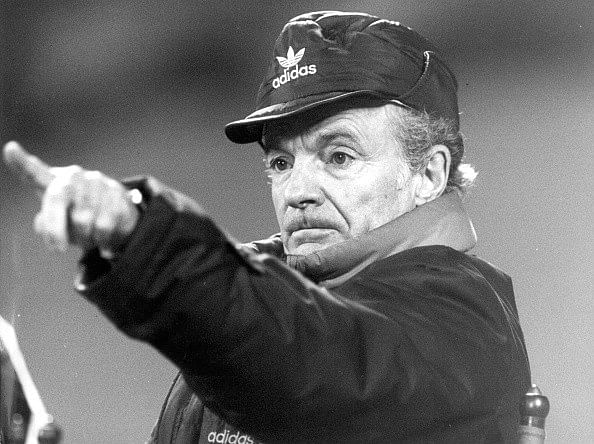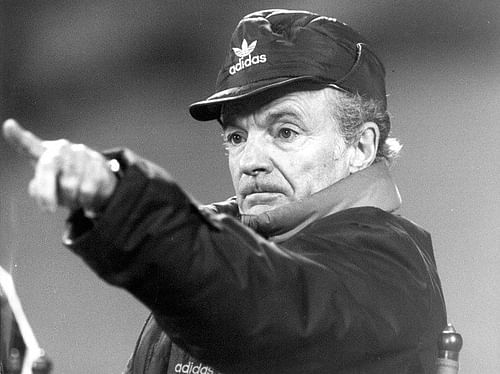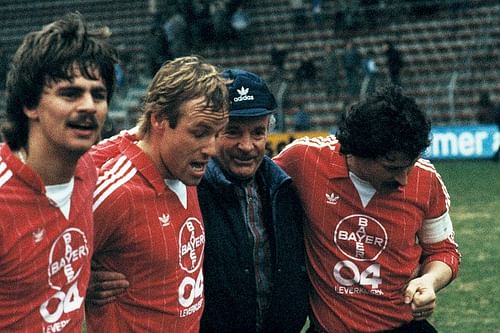
Why is Dettmar Cramer considered to be the professor of German football?

Widely considered as the father of modern football in Japan and the main reason behind Bayern Munich’s success in lifting the 1975 and 1976 European Cups, Dettmar Cramer –popularly known as ‘Napolean’ due to his small stature and a tactical mind – started his career managing Viktoria Dortmund in Germany.
His luck changed when the German Football Association hired him as the head coach for Western Germany in 1949 where he worked until relocating to Japan.
Father of Japanese football
In 1960, Cramer was hired as the coach of Japanese football team ahead of the 1964 Tokyo Olympics. Japan reached the final eight in the competition and the entire credit for making an amateur Japanese team a strong side was given to him.
He stayed back in the country until 1964 to further consolidate the J-League by giving it a proper structure and training system. This bore fruit as Japan went on to win the Bronze medal at 1968 Mexico Olympics.
Cramer is considered to the engineer of Japanese football in the modern day and is a loved figure over there.
Days with the German Football Association
Earlier having worked with the German Football association for more than a decade, in 1964 Cramer rejoined them as he returned to Germany after being announced the assistant coach of the football team ahead of 1966 World Cup in England. Although the West German team lost 4-2 to the hosts – after a controversial third goal was awarded — in the final, the campaign was seen as a success overall.
Work on the international football circuit
Cramer’s talents weren’t unnoticed by the top brass at FIFA, who after the World Cup contracted him for the next eight years as a coach. In that time, he travelled to Japan and lay the foundation of the coach training structure and ran the first coaching course himself in 1969. He worked with the coaching team in Egypt for a few years after that and in 1974 was selected to coach the United States (Men’s) national football team.
Life in the Bundesliga and European Cup success
After turning down a significant number of coaching offers from Bundesliga clubs, Cramer settled down on a job as a manager of the German giants Bayern Munich. He took over the reigns of the club in January 1975, but wasn’t a hit with the fans and management alike, with numerous rumours of him being sacked doing rounds.
Although Cramer faced great challenges from his critics, Franz Beckenbauer, the captain along with his team was in strong support of the coach. Their decision to stand by their coach reaped great fruits as Cramer led the Bavarians to two consecutive European Champions Cups followed by a Club World Cup.

However, after an unsuccessful third season as Bayern failed to defend their domestic title, Cramer was moved to Eintracht Frankfurt as part of a swap deal which saw Gyula Lorant make his way to Bayern.
After a failed season at Frankfurt, Cramer left for Saudi Arabia and joined Al-Ittihad for three seasons before moving back to the Bundesliga as a manager for Bayer Leverkusen in 1982, which is the last club he coached. He managed to lead the team to their first ever top 10 finishes in the league during his second season with them.
Dettmar’s Personal Laurels
- He was presented with the Federal Cross of Merit (Bundesverdienstkreuz) in Germany.
- He received a membership in the Order of the Sacred Treasure by Emperor Showa (Hirohito) of Japan for his crucial service to the footballing fraternity there.
- The German Football Association have presented him with a lifetime achievement award for his work in the field of football, especially for Germany.
- In 2005, Cramer was inducted in Japan’s Soccer Hall of Fame.
- He was also the honorary chief of the Native American Sioux and Mohican tribes.
The great professor of German Football breathed his last breath on 17th September 2015 and will be forever embedded in the hearts and minds of countless people in Germany, Japan and football fans all across the globe.